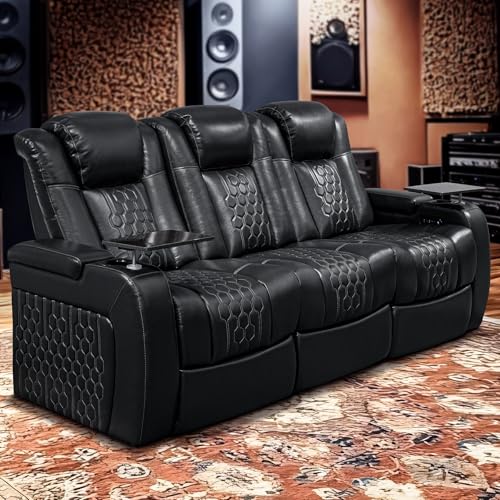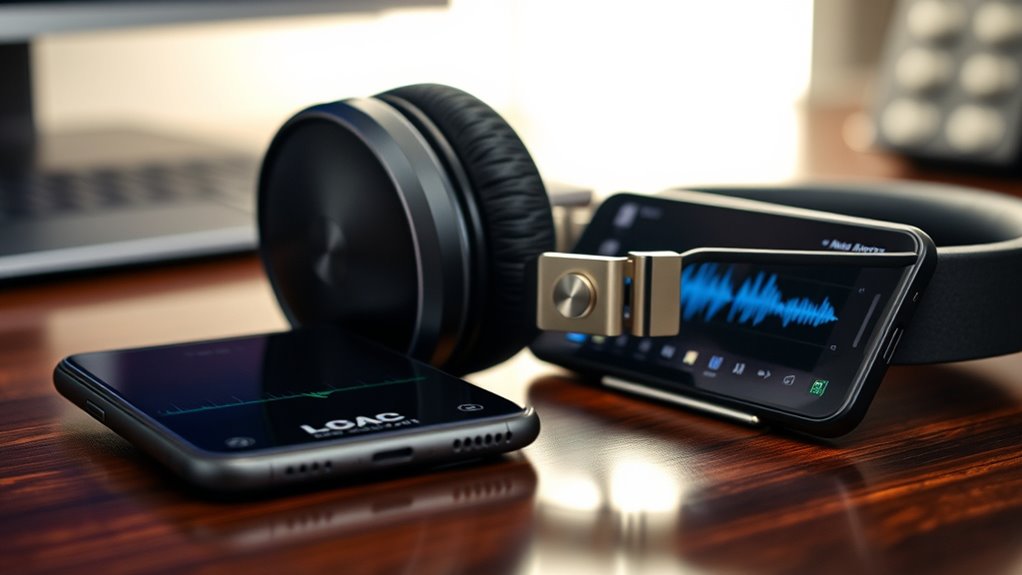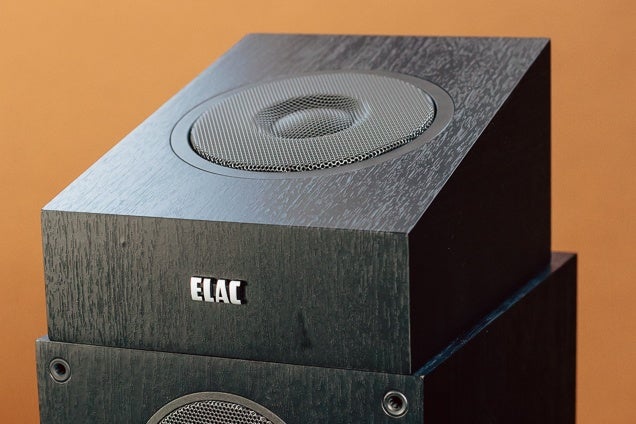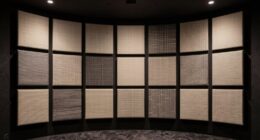Audio codecs like AAC, aptX, LDAC, and Lossless help your device compress and transmit sound wirelessly. AAC offers broad compatibility and decent quality, while aptX minimizes lag for gaming and videos. LDAC supports higher bit rates for premium listening, and Lossless codecs deliver uncompressed audio for true fidelity. Your experience depends on which codec your device uses, impacting sound quality and latency. To understand how each one works and improve your sound, explore further.
Key Takeaways
- AAC is widely compatible, efficient, and offers good sound quality for streaming and Apple devices.
- aptX focuses on low latency and high-fidelity audio, ideal for gaming and video syncing.
- LDAC supports higher bit rates, enabling near-lossless, high-resolution wireless audio.
- Lossless codecs transmit uncompressed or minimally compressed audio, ensuring the highest sound fidelity but require more bandwidth.
- Codec choice influences sound quality, latency, and device compatibility, impacting overall wireless listening experience.

Audio codecs are indispensable tools that compress and decompress digital sound to make it easier to store and transmit. When you’re streaming music or making a wireless call, these codecs play a vital role in ensuring the sound reaches you clearly and efficiently. They handle audio compression, reducing the size of audio files without sacrificing too much quality, which is especially important for wireless transmission. Without effective codecs, transmitting high-quality audio over Bluetooth or Wi-Fi would be slow and unreliable, leading to lag, distortion, or dropped connections.
Audio codecs are essential for clear, efficient wireless sound transmission and storage.
Wireless transmission relies heavily on audio codecs because they determine how well your device can send and receive sound data. For instance, codecs like AAC, aptX, and LDAC are designed to optimize this process, balancing sound quality and data rate. When you connect wireless headphones, your device and headphones negotiate which codec to use, often choosing the most advanced one both support to maximize audio fidelity. AAC is widely supported and offers good quality with efficient compression, making it a popular choice for streaming services and Apple devices. It guarantees that your music sounds rich and clear without demanding excessive bandwidth, which is essential for maintaining a smooth wireless experience.
AptX codecs, developed by Qualcomm, focus on low latency and high-fidelity audio. If you’re watching videos or gaming wirelessly, aptX can deliver audio with minimal delay, so sound stays synchronized with the visuals. This codec is favored for its ability to maintain audio quality during wireless transmission while minimizing lag, which is critical in real-time applications. LDAC, developed by Sony, takes this a step further by supporting higher bit rates, allowing for near-lossless audio over Bluetooth. When you’re listening to high-resolution audio files wirelessly, LDAC preserves more of the original sound details, giving you a richer listening experience.
Some users prefer lossless codecs or formats that transmit uncompressed or minimally compressed audio. Although these require more bandwidth and may not always be suitable for wireless transmission, they guarantee you get the purest sound possible. Lossless codecs are ideal if you’re an audiophile or want the most accurate reproduction of your recordings. Overall, understanding how audio codecs work helps you appreciate the technology behind wireless audio and how it impacts your listening quality. Choosing the right codec depends on your priorities—whether it’s minimizing latency, maximizing sound fidelity, or balancing both for seamless wireless transmission.
Additionally, understanding the importance of audio quality in codecs can help you make better choices when selecting audio devices, ensuring you get the best listening experience possible.

HKUVUKH Home Theater Seating, Living Room, Powered Headrest, Powered Lumbar, Italian Leather, Powered Recline (Black, Row of 3 Console)
Premium Italian Leather: The HKUVUKH Home Theater Seating is crafted from high-quality Semi-Aniline Italian Leather 11000, offering a...
As an affiliate, we earn on qualifying purchases.
Frequently Asked Questions
How Do Audio Codecs Impact Battery Life on Devices?
Audio codecs directly impact your device’s battery life through their power efficiency. More efficient codecs like AAC and Aptx consume less battery, helping your device last longer during wireless listening. In contrast, high-quality codecs like LDAC and lossless formats require more power due to higher data transfer and processing demands. So, choosing a more power-efficient codec can extend your device’s battery life, especially during prolonged use.
Can I Upgrade My Device’s Codec Support After Purchase?
You can often upgrade your device’s codec support, but it depends on your device’s hardware and software. Check if your device’s firmware or software updates include new codec support, as some manufacturers release updates for compatibility. Keep in mind, not all devices allow codec upgrades, especially if hardware limitations exist. So, verify device compatibility first, and if supported, follow manufacturer instructions for potential codec upgrades.
Are There Compatibility Issues Between Different Audio Codecs?
Yes, there can be compatibility issues between different audio codecs, which affect device interoperability. Not all devices support every codec, so if your device uses a specific codec like LDAC or Aptx, it might not work seamlessly with others that use AAC or different standards. To guarantee smooth playback, check your device’s supported codecs and match them with your audio source or headphones. This helps avoid connection problems or degraded audio quality.
How Do Audio Codecs Affect Latency in Wireless Audio?
You’ll notice that audio codecs considerably impact latency in wireless audio, as Bluetooth profiles depend on codec performance. For example, AptX Low Latency reduces delay, making it ideal for gaming or watching videos. Conversely, codecs like LDAC prioritize sound quality over latency. Your device’s Bluetooth profile determines how well the codec performs, so choosing a codec suited to your activity helps minimize lag and enhances your listening experience.
What Are the Environmental Impacts of Developing Advanced Codecs?
You might not realize it, but developing advanced codecs impacts the environment through increased energy consumption and resource use. This affects the environmental footprint, especially during manufacturing and testing. To promote sustainability, manufacturers can focus on improving manufacturing sustainability, such as using eco-friendly materials and reducing waste. By prioritizing these efforts, you help minimize the environmental impact of these technological advancements, making the development of new codecs more eco-conscious.

Weilianda Chic Top Grain Leather Home Theater Seating Power Headrest Recling Movie Gaming Recliner Sofa with 7 Colors Ambient Lighting, Golden Cup Holder Carbon Fiber Tray Table Row of 3 Black
TOP-GRAIN LEATHER: Weilianda home theater seating is designed to provide the ultimate level of comfort and convenience for...
As an affiliate, we earn on qualifying purchases.
Conclusion
Just like Orpheus trusted the lyre to guide him through the underworld, trusting the right audio codec can elevate your listening experience. Whether you favor AAC’s broad compatibility, aptX’s low latency, LDAC’s high resolution, or lossless formats, each offers a unique journey into sound. By understanding these codecs, you’re not just hearing music—you’re embracing a symphony of possibilities. So, choose wisely, and let your audio adventure begin, echoing through every note like a timeless myth.

comfiroom Leather Home Theater Seating Classic Series Dual Power Electric Headrest Game Seats Movie Theater Chairs Theater Recliner Sofa with Type-C USB Charger (Black, Row of 3)
COMFORT COMES FIRST: The Comfiroom home theater sofa is crafted from premium leather, offering a delicate and smooth...
As an affiliate, we earn on qualifying purchases.

PBRO Home Theater Seating Genuine Leather Recliner Chair, Power Reclining & Headrest, USB A/C Charging Ports, Tray Table, Cup Holder Ambient Lighting Black 3 Set
Home Theater Seating: Designed for immersive entertainment experiences, this home theater seating brings cinema-like comfort to your living...
As an affiliate, we earn on qualifying purchases.















